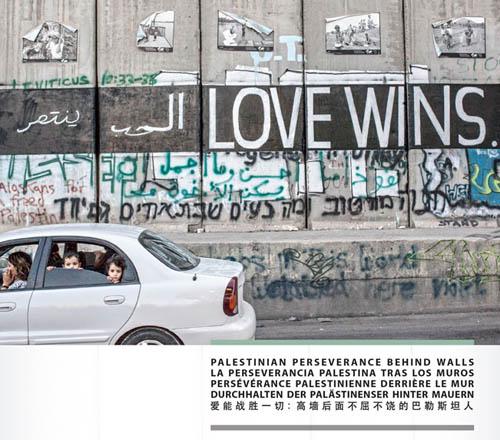You are here
Contrasting oppression with hope
By Sally Bland - Apr 27,2014 - Last updated at Apr 27,2014

LOVE WINS
Photography by Afzal Huda
Conceived by Waleed Abu Ghazaleh
US: Olive Branch Press/Interlink, 2014, 224 pp., $22.
This photo journal takes its title from the slogan — LOVE WINS — written large in English and Arabic amidst a wealth of other graffiti on a section of the Apartheid Wall in Palestine, as can be seen on the cover image. The book itself is a labour of love — love of Palestine, of humanity, of life. It is obviously the result of a collective effort, but the main credit goes to Waleed Abu Ghazaleh, who conceived the idea and design, and Afzal Huda, who took the outstanding photos that give LOVE WINS its substance and impact.
When he set out with his camera in 2011, Huda, an award-winning Canadian filmmaker and photographer, had a negatively defined mission –– to show the ugly face of the Wall and the hardships it inflicts on the Palestinians. Yet, a close look at the images captured by his lens also revealed the subtle, but potentially more powerful, fact of the Palestinians’ compassion, perseverance and hope in the face of the overwhelming obstacles to their daily life and future aspirations presented by the Wall. Thus, the focus of the book shifted slightly to become not only a documentary protest of the oppressive reality imposed by the Israeli occupation, but also “a celebration of Palestinians’ will to persevere and the hope they share of realizing their freedom”. (p. 160) The very first photo exemplifies the contrast that prevails throughout the book between hope and oppression: A smiling woman, probably an international volunteer, walks alongside a dignified, elderly Palestinian man, as Israeli soldiers, one pointing his automatic rifle, peer across the top of the Wall.
In the foreword, Phyllis Bennis, Middle East expert and long-time advocate of Palestinian rights, sums up the most important facts, such as that “only 15 percent of the Wall is built on the Green Line; a full 85 per cent snakes through the West Bank, plunging deep into Palestinian land,” whereby the major settlements and water resources “end up on the Israeli side”. (p. 4) Like the overall thrust of the book, Bennis also highlights the positive aspect: “For the Palestinians, the Wall has created whole new strategies of resistance to the occupation,” flowing “into a wide river of resistance.” (p. 5)
The pictures are divided into four parts, each introduced by a brief text on the impact of occupation policies in five languages (English, Spanish, German, French and Chinese). Pictures in the first part, titled “Faces of Walls,” show the maze of huge concrete structures, watchtowers, barbed-wire fences, gates and terminals (more like holding pens) that stretch across agricultural land, into towns and sometimes into people’s backyards. But here also, there is hope as we see the amazing graffiti in which the LOVE WINS slogan is embedded, as well as other positive phrases painted on the Wall, such as “Bridges not walls” and “Love will set us free.”
Yet more poignant than slogans are the people seen in the next section, “Faces of Life”, featuring pictures of Palestinians persistently carrying on with their lives in the shadow of the Wall — working, playing, protesting, waiting to cross over, showing themselves to be “Stronger than the Wall”, as is scrawled across the side of a house. The third part, “Faces of Support,” highlights the role of international activists, and includes some of the most colourful wall paintings and graffiti in different languages. Emblazoned on the Wall are large paintings of Palestinian icons from Marwan Barghouti to Mahmoud Darwish, powerful slogans like “Free Palestine — Boycott Apartheid” and “This wall will fall,” remakes of Naji Al Ali’s caricatures, and quotes from international figures like Martin Luther King.
The photos in the final part, “Faces of Hope” present a panorama of Palestinians at home and school, in streets and marketplaces, sporting traditional or modern dress; in short, all sorts of people. We see the endearing smiles and irrepressible laughter of children, the exuberance of youth, proud parents and the dignity of the older generation. Most amazing is a series of shots of people in a bare-bones tent camp, presumably after their homes were demolished. Small boys play soccer and tetherball, while a mother helps her daughter stay on one end of a makeshift seesaw fashioned from the rubble of what was probably once their home. That’s resilience!
As with any good photography book, words fall short of conveying the full impact, but the quite reasonable price of this book makes it possible for many to see for themselves. LOVE WINS is a great tribute to the resilience of the Palestinians, and a source of much-needed encouragement at a time when mainstream media paint only dismal or distorted pictures.
Sally Bland
Related Articles
Due to its format, this collection of photos and essays about Israel’s apartheid wall is more than a book. It is an imaginative project shaped in the form of an accordion.
Everywhere you turn, walls in the Gaza Strip are covered with paint — brightly coloured slogans, political portraits and prose.
Having already published several excellent books on different aspects of Palestinian reality, Suad Amiry finally turns to her own field: architecture. The setting and subject matter of “Golda Slept Here” are the beautiful old Palestinian homes in the part of Jerusalem that was occupied in 1948, now dubbed West Jerusalem.












